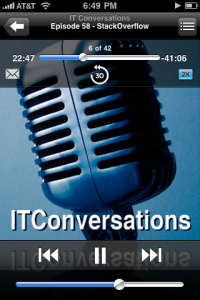One of my pet peeves is a request in the form of an incomplete “if” statement, e.g. “If you could get me that report by 2:00 PM.” Maybe it’s just me, but the programmer in me thinks that “if” clauses are always followed by “then” statements.
This made Steven Pinker’s talk on language and thought very interesting to me. Why do we speak like this?
Language as a social interaction has to satisfy two conditions: You have to convey the actual content. You want to express the bribe, the command, the promise, the solicitation, and so on. But you also have to negotiate and maintain the kind of relationship you have with the other person. The solution, I think, is that we use language at two levels: The literal form signals the safest relationship for the listener, whereas the implicated content–the reading between the lines that we count on the listener to perform–allows the listener to derive the interpretation which is most relevant in context….
The simplest example of this is in the polite request. If you express your request as a conditional–“if you could open the window, that would be great”–even though the content is an imperative, the fact that you’re not using the imperative voice means that you’re not acting as if you’re in a relationship of dominance where you could presuppose the compliance of the other person. (Steven Pinker, The Stuff of Thought, 14:06-15:10.)
Just in time for Valentine’s Day, Truman Madsen has a similar thought on the language husbands and wives use with each other:
Now, a woman who is a woman delights in being thought a woman. She is “romance conscious,” and in the deeper sense love-anxious most of the time. The language she understands includes a lot of little (and in the opinion of many husbands, disgustingly trivial) things…the tender touch, the kiss good-by, the kiss hello. A morning of robust yard work is not as eloquent to her as the quiet smoothing of little hurdles, the gallantry of an open door, helping her with a chair or a coat and these mean a hundred times more to her feelings of response than the salary you bring home. Having an eye for the new dress or even the old one, saying the word, however inept or inadequate, about this salad or that gravy, remembering and repeating utterly trivial sentiments and events which no grownup man can remember unless he wants to, no woman can forget even if she tries.
…
Universally, woman is made rich by the man who knows that these touches mean everything. This language speaks to her being. She will respond to it and give.
Now, turn to the man. A man who is a man delights in being thought a man. He is “authority conscious.” The language he understands includes a lot of little things, the language of her listening even to his nonsense, the language of biting her tongue instead of lashing with it when his decisions are finally made, the uninterrupted phone call, the restraining of curiosity, the controlling of the disposition to inquisition. (A wife who insists on knowing nothing will eventually have everything, but the wife who insists on knowing everything will eventually have nothing.) The man understands the language of flexibility in a wife who respects his final decisions (even the decision of not to decide), or even so trivial a matter as when we leave the party. The man comprehends the exhilaration of a woman who, when his delays bring him home late, offers a brighter welcome instead of a dismal doghouse.
Universally, a man is responsive to these little matters which mean everything to him. He will rise to them and give in kind.
It is easy to say that we should prize other languages. If a man brings home the bacon and doesn’t complain at the wife’s food, and shows sympathy for her lot, then why all this emphasis on the romantic sizzle? “If I don’t like your cooking, I’ll say so; otherwise you are doing fine,” said one. On the other hand, if the wife works day and night to tend his kids, to keep his home, and put up with him, then why all the childish emphasis on the authority sizzle? Does a woman have to pander to this desire of a man to have the last word?
Well, it may be strange, as some cynics say (a weird kind of insecurity which mature people ignore), it may even seem ridiculous. But the cost is so little and the results so vast that it is tragic to work against the grain. You can’t speak without speaking a language. And this language is magic. Why not master it and speak it? (Truman Madsen, Four Essays on Love, pp. 56-58.)






